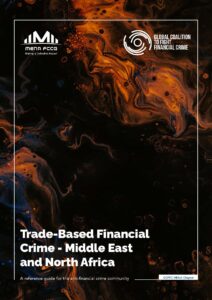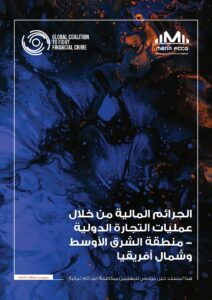Global Financial Integrity (GFI) is a member of the Global Coalition to Fight Financial Crime (GCFFC).
Trade-based financial crime (TBFC) is persistently flagged as one of the most poorly understood risk areas within the anti-money laundering framework. The complexity and extensiveness of the global trade system, which UNCTAD reported as having reached a record volume of USD $28.5 trillion in 2021, makes it vulnerable to use as a conduit for illicit funds, and particularly challenging to protect from criminal abuse. Countries across the Middle East and North Africa (MENA) region that are subject to increased monitoring on the FATF’s Grey List are especially concerned with boosting awareness and competency in detecting and preventing TBFC amongst practitioners.
The MENA Chapter of the GCFFC and the MENA Financial Crime Compliance Group jointly developed this reference guide, titled Trade-Based Financial Crime – Middle East and North Africa, for practitioners to assist in improving awareness of TBFC risks. In line with the Chapter’s overarching mission to enhance local regional expertise and bridge public and private sector efforts, this reference text was created by world-leading experts with a specific focus on how TBFC methodologies are experienced in the MENA region. Despite this geographic focus, it has universal relevance to all practitioners who deal with the intricate, cross border sprawl of the trade system.
GFI’s Illicit Trade Director, Channing Mavrellis, served as the lead editor of the report. She was honored to work on this guide with a team of world-leading experts on illicit trade and TBFC issues, including Project Co-Sponsors Collin Lobo (HSBC) and Scott Ramsey (Mashreq Bank), as well as: Nishanth Nottath (Mashreq Bank), Graham Baldock (Anglo Gulf Trade Bank), Amjad Batayneh (Arab Bank), Jonathan Brewer (King’s College London), and Fahad Haque (HSBC).
The guide aims to provide a single, accessible source of knowledge for compliance professionals, supervisory bodies, customs officials, and law enforcement agencies alike, to create aligned understanding of how the trade system can be abused, what methods are available to detect these abuses, and how that information can be deployed by the authorities to prevent further occurrences of trade-based financial crime.
The GCFFC MENA Chapter and the MENA FCCG developed this guide for the benefit of all professionals based in the region and further afield, concerned with protecting the integrity of the regional economy. Continuing their strategic partnership, both organizations are committed to bringing best in class TBFC training to the region under future initiatives.



